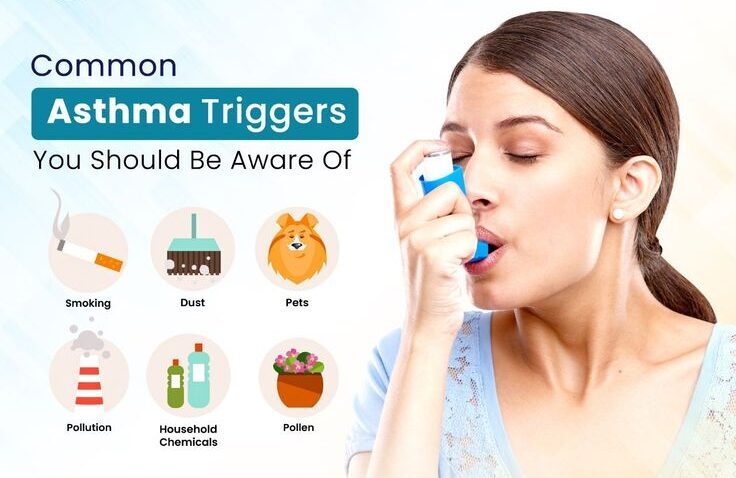Last updated on April 23rd, 2025 at 05:37 pm

Is Asthma Curable – Millions of people worldwide suffer from asthma, a chronic respiratory disease. It is characterized by inflammation and narrowing of the airways, leading to symptoms such as wheezing, coughing, shortness of breath, and chest tightness. The prevalence of asthma has been on the rise in recent years, with the World Health Organization (WHO) estimating that it affects over 339 million people globally. The question of whether asthma is curable is a common one, as many individuals living with this condition seek ways to manage their symptoms and achieve a better quality of life.
The severity of asthma can vary greatly from person to person, with some individuals experiencing mild, infrequent symptoms, while others suffer from severe and persistent symptoms that can be life-threatening. Asthma can be triggered by various factors, including allergens, irritants, infections, exercise, and stress. Due to its chronic nature, asthma often requires long-term management, which typically involves a combination of medications, lifestyle changes, and self-monitoring.
Understanding the question of “Is asthma curable?” is essential for those living with this condition and their healthcare providers, as it can help guide treatment decisions and set realistic expectations for symptom management. The answer to this question is complex, as there is currently no known cure for asthma. However, there are many treatment options available that can help individuals achieve better control over their symptoms and improve their quality of life.
Homeopathic Medicine for Asthma
Homeopathic medicine is an alternative treatment approach that has been used for centuries to treat various health conditions, including asthma. Homeopathy is based on the principle of “like cures like,” meaning that a substance that causes symptoms in a healthy person can be used to treat similar symptoms in a sick person when given in small, diluted doses. Homeopathic remedies for asthma aim to stimulate the body’s natural healing response and reduce the frequency and severity of symptoms.
Some commonly used homeopathic remedies for asthma include Arsenicum album, Natrum sulphuricum, and Pulsatilla. These remedies are often chosen based on the specific symptoms and individual characteristics of the person with asthma. Homeopathic asthma treatment may be used alongside conventional medical treatments or as part of a comprehensive asthma care plan.
While some studies have suggested that homeopathic medicine may be beneficial for asthma, the overall evidence is limited and of low quality. As a result, many healthcare professionals are sceptical about the effectiveness of homeopathy for asthma and recommend that individuals continue to use conventional treatments. However, some people with asthma may find relief from their symptoms through homeopathic treatment, and it is essential to discuss all treatment options with a healthcare provider.
Ayurvedic medicine for Asthma: An ancient approach to relief
Ayurveda is an ancient system of medicine originating in India, which focuses on achieving balance in the body and mind through diet, lifestyle, and herbal remedies. Ayurvedic medicine for asthma seeks to address the root cause of the condition and restore balance to the body’s systems. Treatment approaches may include dietary modifications, herbal supplements, breathing exercises, and meditation.
Some common Ayurvedic herbs used to treat asthma include liquorice, turmeric, and ginger. These herbs are believed to have anti-inflammatory, bronchodilatory, and immune-modulating properties, which may help alleviate asthma symptoms. Ayurvedic treatment for asthma may also involve the use of herbal formulations such as Chyawanprash, a jam-like mixture of herbs, fruits, and spices that are believed to support lung health and improve respiratory function.
Like homeopathy, the evidence supporting the effectiveness of Ayurvedic medicine for asthma is limited. However, some individuals with asthma may find relief from their symptoms through Ayurvedic treatment. As with any alternative treatment, it is essential to discuss the use of Ayurvedic medicine with a healthcare provider before incorporating it into an asthma care plan.
Asthma Care Plan – Importance of having a Plan in Place
An asthma care plan is a critical component of effective asthma management. It is a personalized, written document that outlines the steps an individual with asthma should take to prevent and manage their symptoms. Asthma care plans are typically developed in collaboration with a healthcare provider and are tailored to the specific needs and goals of the person with asthma.
A comprehensive asthma care plan should include information on the individual’s asthma triggers, medications, and self-monitoring techniques, as well as an action plan for managing asthma exacerbations. The plan should be reviewed and updated regularly to ensure that it remains relevant to the individual’s changing needs and circumstances.
Having an asthma care plan in place can help individuals with asthma achieve better control over their symptoms, reduce the risk of exacerbations, and improve their overall quality of life. It can also facilitate communication between the person with asthma and their healthcare provider, ensuring that they receive the appropriate care and support.
Related:
- Asthma Treatment in Hindi
- What is the Asthma Treatment?
- Types of Asthma
- Healthy Diet and Exercise for Improving Health of Asthma Patients
- Asthma vs. COPD
Asthma Drugs Classification: Conventional Medical Treatments
Conventional medical treatments for asthma can be broadly classified into two categories: controller medications and rescue medications. Controller medications are used on a long-term basis to reduce inflammation and prevent asthma symptoms, while rescue medications provide rapid relief during an asthma exacerbation.
Controller medications include inhaled corticosteroids, which are the cornerstone of asthma treatment, as well as long-acting beta-agonists, leukotriene modifiers, and theophylline. These medications work in different ways to reduce airway inflammation and improve lung function, and they are often used in combination to achieve optimal asthma control.
Rescue medications include short-acting beta-agonists, which are bronchodilators that provide rapid relief from asthma symptoms by relaxing the muscles around the airways. These medications are typically used on an as-needed basis and should not be relied upon for long-term asthma control.
In addition to these medications, some individuals with severe asthma may require other treatments, such as biologic therapies or oral corticosteroids. The choice of medication and treatment approach will depend on the severity of the individual’s asthma and their response to treatment.
Homeopathic Nebulizer Medicine for Asthma: How they work and their benefits
The use of nebulizers allows for the direct inhalation of liquid asthma treatments into the lungs. They are often used for individuals who have difficulty using inhalers or who require higher doses of medication to manage their asthma symptoms. Nebulizers can be used with both controller and rescue medications, making them a versatile tool in asthma management.
Using a nebulizer to treat asthma has many advantages. The fine mist delivered by the nebulizer allows for more efficient delivery of medication to the lungs, which can result in faster symptom relief and improved lung function. Nebulizers can also be used by individuals of all ages, including young children and older adults, who may have difficulty using inhalers.
While nebulizers can be an effective treatment option for some individuals with asthma, they may not be suitable for everyone. Nebulizers can be more time-consuming to use than inhalers and may require more maintenance and cleaning. Additionally, some individuals may find the noise produced by the nebulizer to be bothersome. It is essential to discuss the use of a nebulizer with a healthcare provider to determine if it is the right treatment option.
Top Nebulizers for Effective Asthma Relief
There are many different nebulizer models available on the market, each with its own features and benefits. Some of the top nebulizers for effective asthma relief include:
1. PARI Vios Pro Nebulizer System
This high-performance nebulizer is designed for heavy-duty use and delivers consistent, efficient aerosol delivery. It features a powerful compressor and is compatible with a wide range of medications.
2. Omron NE-C801 Compair Nebulizer System
This compact, lightweight nebulizer is designed for portability and ease of use. It features a quiet operation and a short treatment time, making it ideal for use at home or on the go.
3. Philips Respironics InnoSpire Essence Nebulizer System
This reliable nebulizer system features a compact, easy-to-use design and delivers consistent aerosol delivery. It is compatible with a variety of medications and includes a reusable nebulizer for long-term use.
4. MedPro Nebulizer with Compressor
This affordable, easy-to-use nebulizer system is designed for home use and provides efficient aerosol delivery. It features a powerful compressor and is compatible with most medications.
> Consult a Doctor and Buy Nebulizers for Asthma from here – Order Medicines Online
When choosing a nebulizer, it is essential to consider factors such as the type of medication being used, the individual’s needs and preferences, and the device’s features and performance. A healthcare provider can help determine the best nebulizer for an individual’s needs.
Lifestyle changes to support Asthma Management
In addition to medications and treatments, lifestyle changes can play an essential role in asthma management. Some lifestyle changes that may help support asthma management include:
- Identifying and avoiding asthma triggers: Becoming aware of the specific factors that trigger asthma symptoms can help individuals reduce their exposure and minimize the risk of exacerbations.
- Maintaining a healthy weight: Obesity has been linked to increased asthma severity, and losing weight can help improve lung function and reduce the need for medication.
- Practising good hygiene: Regular handwashing and cleaning of the home can help reduce exposure to allergens and irritants that can trigger asthma symptoms.
- Engaging in regular physical activity: Regular exercise can help improve lung function and reduce the frequency and severity of asthma symptoms. Before beginning an exercise programme, you should speak with a healthcare professional.
- Managing stress: Stress can trigger asthma symptoms in some individuals, so it is important to find healthy ways to manage stress, such as relaxation techniques, meditation, or counselling.
- Getting enough sleep: Poor sleep quality or insufficient sleep can worsen asthma symptoms, so it is important to aim for 7-9 hours of sleep per night and practice good sleep hygiene.
By incorporating these lifestyle changes into an asthma care plan, individuals with asthma can take a proactive approach to symptom management and improve their overall quality of life.

Read: What are Generic Medicines?
Conclusion: Is Asthma Curable
While there is currently no known cure for asthma, there are many treatment options available that can help individuals achieve better control over their symptoms and improve their quality of life. Alternative treatments such as homoeopathic and Ayurvedic medicine may be beneficial for some individuals, but the evidence supporting their effectiveness is limited.
Conventional medical treatments, including controller and rescue medications, are the cornerstone of asthma management and should be used in combination with an asthma care plan that includes self-monitoring, trigger avoidance, and lifestyle modifications. Nebulizers can be an effective treatment option for some individuals with asthma, but it is important to discuss their use with a healthcare provider.
By working with a healthcare provider to develop a personalized asthma care plan and incorporating lifestyle changes into daily routines, individuals with asthma can achieve better control over their symptoms and lead a full, active life.
FAQs on the Curability of Asthma
Q1: Is asthma curable?
While asthma is a chronic condition with no known cure, it can be effectively managed and controlled through proper medical treatment and lifestyle changes. Homoeopathic medicines and nebulizers can play a role in symptom relief and management.
Q2: Can homeopathic medicines help with asthma?
Some individuals may find relief from asthma symptoms through homeopathic treatments. However, it’s important to note that scientific evidence supporting the efficacy of homeopathy for asthma is limited. Consult a qualified healthcare professional before considering homeopathic remedies.
Q3: What are homeopathic nebulizer medicines and how do they work for asthma?
Nebulizers are medical devices that convert liquid medication into a fine mist, allowing patients to inhale the medication directly into their lungs. This can provide quick relief by delivering bronchodilators and anti-inflammatory drugs to reduce asthma symptoms and improve breathing.
Q4: What are the top nebulizers recommended for asthma relief?
Some top nebulizers for asthma relief include brands like Philips Respironics, Omron, and Pari. The choice of nebulizer depends on individual preferences, portability needs, and the specific medication prescribed by a healthcare provider.
Q5: How should I use a nebulizer effectively for asthma management?
To use a nebulizer effectively, follow these steps:
- Wash your hands before assembling the nebulizer.
- Measure the prescribed medication and add it to the nebulizer cup.
- Assemble the nebulizer and connect it to the compressor.
- Sit upright, place the mouthpiece or mask over your mouth and nose, and start the nebulizer.
- Breathe slowly and deeply through the mouthpiece or mask until the medication is completely gone, usually around 5-10 minutes.
- Clean and store the nebulizer after each use as per the manufacturer’s instructions.
Related Links:
Call to Action:

For access to more such interesting articles on healthcare, visit Medkart today!

